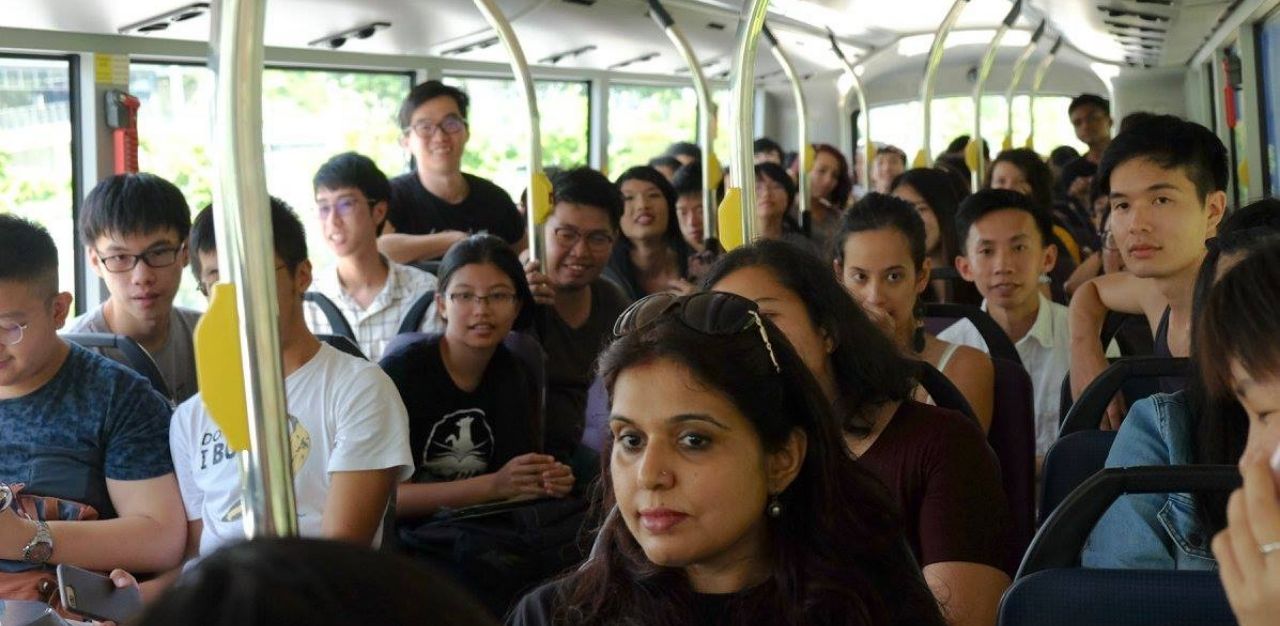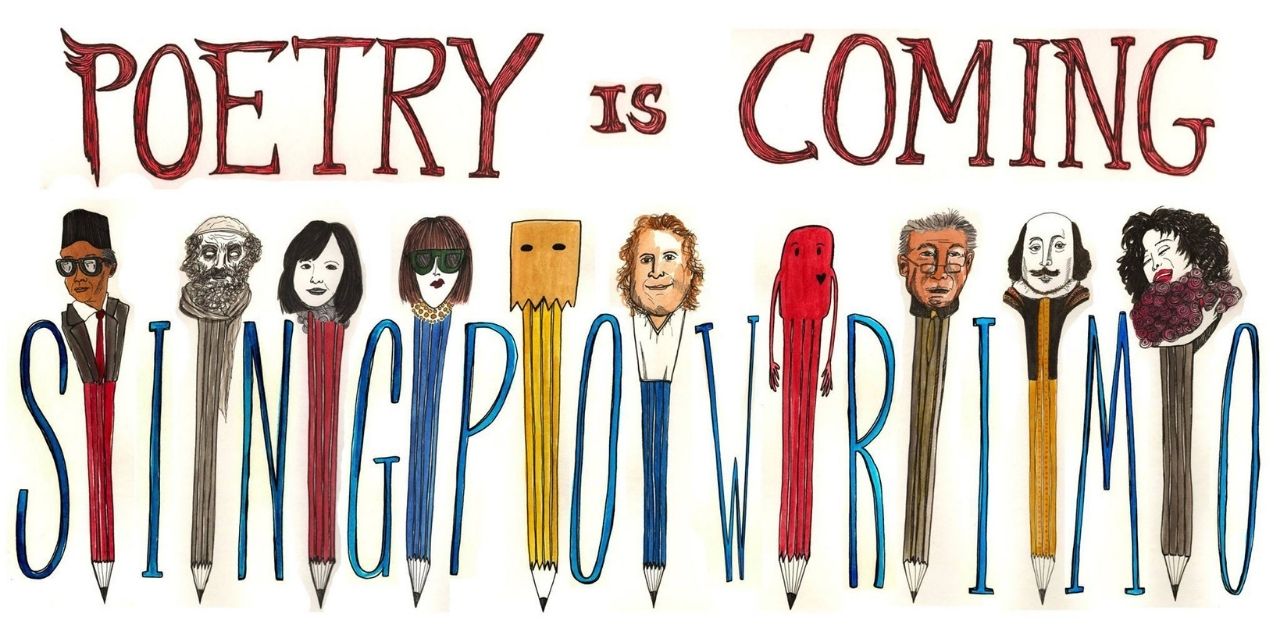Through our new series of weekly interviews called In Conversation With, TheHomeGround Asia amplifies and celebrates the ideas, achievements and experiences of extraordinary individuals, who are creating ripples in their industry in unique ways. Our third installment features Joshua Ip, a luminary in the local literary scene. With numerous accolades under his belt, Mr Ip dons multiple hats of poet, writer, editor, literary organiser and Station Director of Sing Lit Station.
Multi-hyphenated Joshua Ip has been writing since his secondary school days. Nearly three decades later, he is still at it, and in it deeper than ever before. When asked about why he writes, his answer is simple, matter-of-fact, but all-encompassing: “I enjoy it!”
The love for his craft has driven the illustrious writer to publish four volumes of poetry thus far (with a fifth on the way), and co-edit another 11 poetry anthologies. His debut collection, sonnets from the singlish won the Singapore Literature Prize in 2014.

Besides that, Mr Ip received the Young Artist Award in 2017, an Honorable Mention for Chinese Poetry in 2015 and the Golden Point Award for English Prose in 2013, as well as came runner-up for English Poetry in 2011.
As one of the many faces of Singapore’s literary scene that the nation can be proud of, he has represented the island city at various international literary festivals around the world, including in Goa, Guangzhou, London, and New York City.
Beyond pursuing his own writing, Mr Ip has been encouraging other budding writers and poets to pursue theirs. In April 2014, he co-founded the inaugural Singapore Poetry Writing Month (SingPoWriMo), drawing more than 500 local poets to write a poem a day for 30 days in its first iteration. Four years later, in 2018, the movement saw over 5,000 poets contributing to it.
Continuing to build on the legacy of local poets and writers, Mr Ip co-founded Sing Lit Station in 2016, a literary non-profit organisation (NPO) to develop Singapore’s writing scene. As Station Director, Mr Ip has led the NPO from strength to strength: Running the world’s first performance poetry/professional wrestling hybrid performance, Sing Lit Body Slam; helming hour-long poetry readings on Singapore’s public transportation; and painting invisible poems on Singapore’s sidewalks that appear only in the rain are just some of the organisation’s greatest hits.

In conversation with TheHomeGround Asia, Mr Ip who started writing in secondary school talks about whether it can make for a sustainable career, his tenure running Sing Lit Station and why it is important to cultivate Singapore’s next generation of writers.
NOTE: This interview has been edited for clarity and length.
Joshua Ip: Writing is not my career, and as long as you live in Singapore it is not a sustainable career path. Singapore does not have a sufficiently large book-reading market to sustain full-time writers. All ‘full-time writers’ are either teachers, or temporarily sustained by grants/residencies, or full-time writers who produce copy or commercial editorial, as opposed to full-time literary writing, or independently wealthy. The rest of us write in whatever snatches of free time we have.
TheHomeGround Asia: Do you have a book, story, poem, or collection that you’re most proud of?
JI: I’ll stretch that and talk about two books – one is my upcoming fifth poetry collection, tentatively titled translations from the tanglish. it’s a collection of classical Tang and Song poetry such as Li Bai’s 静夜思 / 窗前明月光 and Su Dong Po’s 水调歌头 / 明月几时有, that every nominally-Chinese-speaking schoolboy has been forced to memorise random lines from at some point of time – except translated into English, and into a contemporary 2021 and/or Singaporean context. With iPhones instead of the moon, with Marina Bay Sands instead of random towers, with motorbikes instead of horses, and with Covid-19 instead of war-torn China. I hope it helps give these ancient poems new life and makes them exciting and relevant to modern readers once again.

I also want to talk about the latest anthology I edited – Call and Response 2, a collection of Singapore migrant writing, that pairs migrants and Singaporeans (or migrant Singaporeans and Singaporean migrants, whatever those words mean…) to write poetry or short stories to each other. It collects some of the most heartbreaking writing – stories of domestic worker abuse, construction workers confined in dorms during COVID, intertwined with genuine attempts at empathy, understanding, generosity, and curiosity. I do hope this collection helps more Singaporeans understand the lives of migrant workers, and recognise that Singapore is really a migrant nation that can do better in taking care of some of the people who build and tend our homes.
THG: Where do some of your best ideas hit you?
JI: In the face, or in the gut. Most poems begin as a single line that sticks in your head and that you can’t get out – and then it begins to accumulate more words around it, that rhyme or sing or reason or dispute with its own constituent words, until it is too heavy to hold in my random access memory and needs to be committed to a page.
THG: How do you approach writing? Is there a method to the madness?
JI: Generally I’m known as a formal poet – a poet that writes into structures such as rhyme and meter. I enjoy having the musical elements of poetry lead the way, and allowing wordplay and imagery to follow the harmonies. Everything I write is intended to be read out loud, so I really repeat words and lines in my head to hear the sound of them, and then variations and development occur – it is, in its own way, just like writing a song.
It also helps me (perversely) to impose some form of time constraint on the writing – whether naturally so, because I am quite busy; or artificially so, through activities like the ongoing Singapore Poetry Writing Month (SingPoWriMo), where poets challenge themselves to write 30 poems in 30 days on Facebook every April. I find that the challenge of a deadline spurs me on to get things done, whereas an open-ended writing exercise generally leaves me distracted and rolling around on the floor.
THG: Given that you’re Director of Sing Lit Station, how does your identity as a Singaporean tie in to your writing?
JI: I think in my earlier days as a younger writer I did try to assert the importance of writing what one knows – in my case, Singapore. Under a tight time constraint, one has no time to pretend that one knows anything about snow or mountains or Turkish Delight – you write what comes to mind, which is very often what you see every day, whether mosquitoes or cai png (rice with vegetables) or Singlish. But these days I find that an explicit reminder is no longer necessary. It is very hard to take Singapore out of a Singaporean, even when they are trying very hard to pretend not to be a Singaporean. A writer doesn’t need to try to be Singaporean – they are, or they aren’t, and their upbringing and experiences will naturally filter through to a greater or lesser degree.

THG: What inspired you to start Sing Lit Station? Tell us more about the journey of running Sing Lit Station so far?
JI: Meeting a community of like-minded lovers of Sing Lit was really the primary motivation – people who really cared about local literature, who came together to participate in activities like SingPoWriMo, and who were willing to give of their time to put together archives like poetry.sg – the community has always been the inspiration. And new communities who have found homes with Sing Lit Station’s support, whether migrant writers or youth writing groups – they continue to give me and the team new inspiration each day to keep on going, to keep innovating and building new and exciting programmes to reach out to more and more Singaporeans.
THG: What do you find special about local literature? Why is it worth cultivating?
JI: People always tell me that the white chai tow kway (carrot cake) at my local market (Bukit Timah Market) is overrated. But I grew up eating that white chai tow kway for multiple decades. To me that is what chai tow kway should taste like. What’s special about that chai tow kway, you ask me? The egg? The chai por (preserved radish)? No, it’s simpler than that. It’s special because it is MINE. And as such it will always be worth cultivating to me.
THG: What have some of the most memorable milestones been in running Sing Lit Station?
JI: Running the world’s first performance poetry / professional wrestling hybrid performance, Sing Lit Body Slam (and twice running!) Till that point, I believe poetry had always had more of a staid, nerdy, wallflower type of branding – and suddenly we saw people being flung across the floor while screaming rhyming couplets, and poets hitting each other over the head with the Oxford English Dictionary while reciting blank verse. Was it the pinnacle of literary excellence? I don’t really know about that. Was it memorable? You bet.
Being able to host migrant writers monthly with the Carnival of Poetry and publish the first Singaporean/migrant poetry anthology, Call and Response, was another important moment for me – as a relatively privileged middle-class Singaporean, being forced to read and listen to the experiences of people I could barely identify with, and learning to empathise, to be quiet, to create spaces and give back and enable other people who were not given the opportunities that I have been in my life and literary career – that’s something that continues to inspire me.
THG: What can we expect from Sing Lit in the future? Or more broadly, how do you hope to see local literature developing in the future?
JI: It will develop as far as the next generation carries it. I’ve given almost 10 years to the local literary scene – five personal collections, eleven anthologies. As I’ve just become a father this year, and my job has begun to pick up, I’ve been trying to take a step back – mostly because I’m in a different stage of my life, but also because I feel it’s about time for me to cede space to someone who isn’t a straight, Chinese, Christian, cis male professional.
I’ve enjoyed being a pathmaker and door-opener with everything I’ve accomplished with Sing Lit Station, and I want to move on and hand the keys to someone else before I get accused of being a gatekeeper instead. Sing Lit Station is already being run day-to-day by the amazing Charlene Shepherdson, a formidable poet and spoken word performer, and I look forward to Sing Lit and Sing Lit Station being transformed and reinvigorated by a diverse slate of writers that looks and writes differently from me in all sorts of ways.
Join the conversations on THG’s Facebook and Instagram, and get the latest updates via Telegram.














